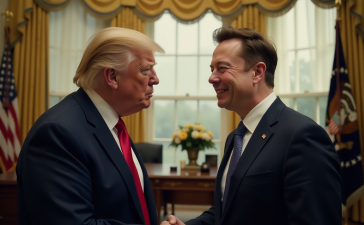Fears of a China trade war erupting under a second Trump presidential term are overblown, according to bosses at Standard Chartered bank, as they suggested that the country’s real estate woes were “largely in the rearview mirror”.
While the London-headquartered bank makes most of its money in Asia, particularly in Hong Kong and Singapore, its chief executive, Bill Winters, played down the impact that increasingly strained relations between Washington and Beijing might have on the business.
Winters told journalists on Tuesday that the administration of US president, Joe Biden, had already been “very hawkish on China”, implementing trade restrictions and sanctions that had not exactly thawed relations with one of the world’s largest economies.
“Whoever wins this election, Harris or Trump, is likely to continue to be hawkish on China,” Winters said.
Any pressure to open up China to the rest of the world will boost business for a cross-border lender like Standard Chartered, Winters added.
“The more China is under pressure from international partners, the more they’re inclined to open up, in order to establish China as a very substantial trade and investment player globally,” Winters said.
He added: “So I won’t say we’re not worried because tension in and of itself is bad for global sentiment and undermines business confidence to some degree. But this is not impacting our business and, you might say, quite the contrary.”
The comments came as the bank reported pre-tax profits of $1.6bn (£1.25bn) in the second quarter, having beat the $1.5bn forecasted by analysts, thanks in part to growth across its wealth division that manages and invests money for rich clients.
Official figures released earlier this month also showed that China’s economy grew 4.7% in the second quarter, falling short of expectations for a 5.1% rise.
Standard Chartered warned that China’s growth rate was “unlikely to return to pre-pandemic levels”, but Winters insisted policymakers were being very deliberate in their management of a maturing economy, including a recent real estate crisis that resulted in the forced liquidation of developer Evergrande.
after newsletter promotion
The bank’s chief financial officer, Diego De Giorgi, said it would be a “fool’s errand” to call a bottom on the China real estate market woes. However, he believed the financial ripple effects had largely been accounted for.
“From our point of view, it’s a problem that is largely in the rearview mirror,” De Giorgi said. In February, the bank said it was expecting a maximum $1.2bn hit linked to its Chinese commercial real estate portfolio.
“We have every confidence that China will maintain strong growth,” Winters added. “It’s still the the largest, or the second largest, contributor to global growth in any particular period, and we expect that will be the case in the quarters and years to come.”










